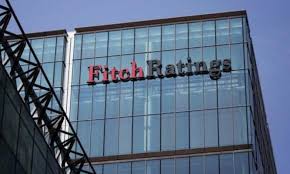581
Daniel Adaji
Fitch Ratings has revised Nigeria’s credit outlook from Negative to Stable, citing a growing sense of confidence in the economic direction pursued by the Tinubu administration.
The move reflects the agency’s recognition of substantial policy shifts that are beginning to yield positive results, though inflation remains a pressing issue.
Despite maintaining the country’s long-term foreign currency rating at ‘B’, Fitch noted that key reforms implemented since mid-2023—such as liberalising the exchange rate, ending fuel subsidies, tightening monetary policy, and halting deficit monetisation—have strengthened Nigeria’s economic fundamentals.
“We are seeing clear signs of increased commitment to market-based reforms under President Tinubu’s administration. While challenges remain, Nigeria’s trajectory has shifted toward stability and greater investor confidence,” Fitch stated.
A central component of this shift was the Central Bank of Nigeria’s (CBN) rollout of a new foreign exchange (FX) matching platform and FX code in 2024.
These changes were designed to improve transparency in price discovery and contributed to narrowing the gap between official and parallel FX market rates following a sharp 40 per cent depreciation of the naira last year.
Consequently, Nigeria recorded an 89 per cent surge in FX inflows through both official and autonomous sources in the last quarter of 2024, up significantly from an 8 per cent rise the previous year.
However, Fitch projects a slight weakening of the naira in the near term, particularly in light of external challenges.
One such threat is the recently imposed 14 per cent tariff on Nigerian exports by the United States.
Business groups, including the Nigerian Association of Chambers of Commerce, Industry, Mines, and Agriculture (NACCIMA), have warned the tariff could significantly affect FX inflows and increase volatility.
JPMorgan has also cautioned that the tariff, along with declining global oil prices, might undermine recent gains in exchange rate stability.
While Nigeria’s macroeconomic indicators have improved, inflation remains a stubborn concern.
The inflation rate, though moderated to 23.2 per cent in February 2025 following a rebasing of the Consumer Price Index, still stands far above the median for countries with a similar rating, which is 4.3 per cent.
To rein in inflation, the CBN has implemented a sharp monetary tightening cycle, raising interest rates by a cumulative 875 basis points since February 2024. The current policy rate stands at 27.5 per cent.
“Monetary stability is critical to maintaining the gains from ongoing reforms,” the agency stated.
Inflation is expected to average 22 per cent in 2025 and decline slightly to 20 per cent in 2026.
Nigeria’s external reserves have also seen some improvement, reaching $41bn by the end of 2024 before easing to $38bn due to external debt servicing, including a $1.1bn Eurobond payment due in November.
The current account posted a $6.8bn surplus in 2024, thanks to reduced import costs and stronger FX formalisation efforts.
On governance, Fitch raised concerns over institutional weakness and policy implementation, pointing to Nigeria’s ranking in the 19th percentile of the World Bank Governance Indicators. Issues such as corruption and regulatory inefficiencies continue to weigh on the country’s credit outlook.
While Nigeria’s macroeconomic picture is stabilising, the road ahead remains bumpy. The country must maintain reform momentum while tackling inflation and improving governance if it is to fully consolidate recent economic gains.



